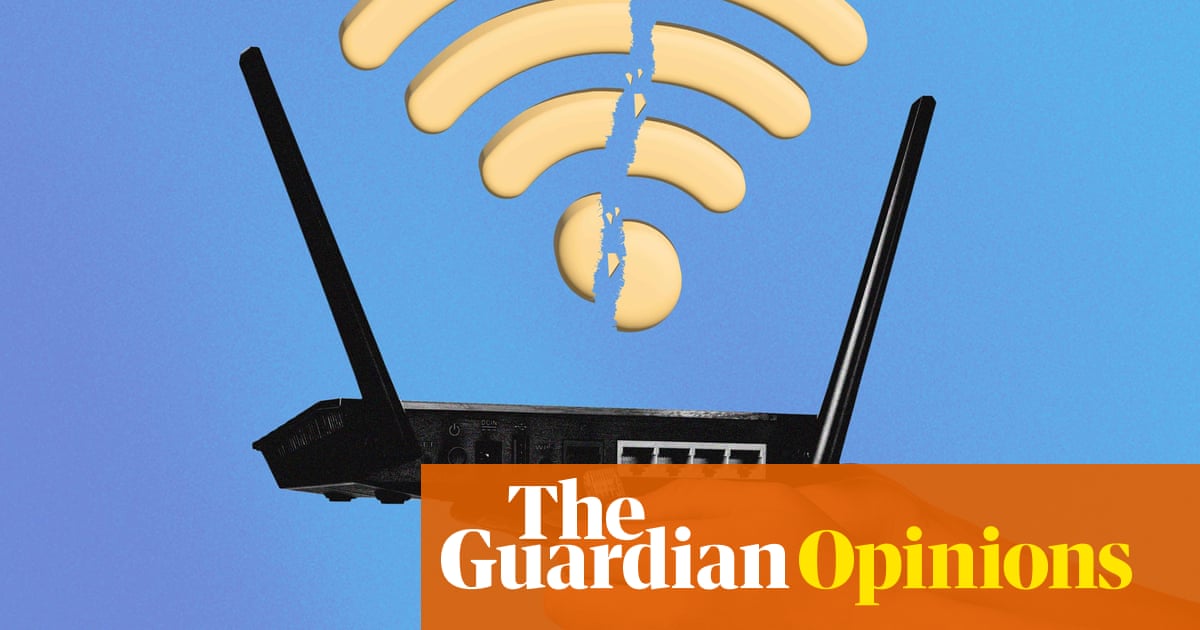Avideo went viralon X a few months ago that I can’t stop watching. It’s 2003:the band thatlater becomes MGMTare performing their song Kids to their peers, years before they become a pop sensation, in a dusty quad at Wesleyan University, Connecticut. Social media doesn’t exist yet. There is something about the way people look and behave and inhabit the space that tugs at my heartstrings and fills me with nostalgia. No one is dressed that well; the camera zooms unsteadily to capture the crowd’s awkwardness, slumped shoulders and arrhythmic bopping. Beyond the footage we’re watching, no one seems to be filming.
I was only four when the video was filmed, so why does watching it make me feel as if I’ve lost a whole world?A recent surveysuggests I’m not alone –that almost half of young people would prefer a world without the internet. If anything, I expected a higher percentage. This doesn’t mean my generation really would like to reverse everything that’s happened in the last few decades, but there’s clearly something we feel we’re missing out on that older people have had, and we attribute it to the internet – or at least to its current form, dominated as it is by social media.
What exactly do we think we’re missing? Personally, I assume that before the social internet people behaved in more authentic and idiosyncratic ways.Social mediahas sped up trend cycles, resulting in an eerieuniformity across styles and personalities: we buy the same products, wear the same clothes, act in the same way, reference the same memes – even quirkiness itself or more “unique” behaviour can be ascribed to trends.
I also imagine that if we weren’t on display all the time, our friendships and interactions could be less commodified. Now, spending time with friends is material to be documented and then demonstrated to a faceless audience.
I’m sure these are rose-tinted assumptions, and I’m conscious too of the things I take for granted about an age of connectivity.Having to trawl through a few measly books and encyclopedias to find anything useful, or growing up in a remote area with little connection to the wider world, surely must have felt both inhibiting and claustrophobic.
But it may be that these “negative” aspects are what young people yearning for disconnectivity actually want – we have a sense that there was a value, now largely lost, in the practical effort required for social interaction, for finding good music, or joining a subculture. Life now in comparison seems streamlined, efficient, moreyassified, in a phenomenon that writer Michael Harris calls a “loss of lack”.
Recently, my office manager showed me the technology he and his friends used to “watch” the football on:Ceefax. The football score would load on a television screen via the changing of a single digit. They would spend the afternoon just sitting on the sofa, waiting for the digit to change (or not). I felt envious of this. Why? If anything, this is clearly a case where an experience has improved exponentially. And yet I’m captivated by the sense of mystery: if they weren’t watching the game or reading the updates, what were they doing? What were they occupying their thoughts with?
The reality might be that they were bored, another scarce experience in a connected age. At least, if bored, they would have entertained themselves with internal rather than external resources. It doesn’t even matter if that was really the case - it is precisely because this experience is unknowable that it is compelling to me. I am haunted by the feeling that spending so much time on our phones has stolen something human and vital from our lives.
It is of course true that each era experiences a crisis about the new wave of tech destroying people’s souls – when it wasn’t the internet, it was TV, or the radio, or the printing press, even papyrus scrolls, and nostalgia is common across every generation. But I don’t think any previous generations were ever so down on their own era, in such large numbers, to the point they’d erase its major salient feature. We feel nostalgic for a world that can’t be brought back. As Donald Trump said, now “everything is computer”.
Ironically, my nostalgia for a pre-internet age is being fed by the internet itself: the machine constantly feeding me clips of the past, footage of young people operating decades ago where everything seems refreshingly unobserved and carefree.
So the very engine of this nostalgia is the thing half of us wish to do away with, despite the fact that it’s an incredible resource, that has allowed unparalleled access to older music, knowledge, ways of living – and is also by nature democratic, questioning traditional media outlets on global affairs and challenging convention.
If this survey is a canary in the mine, what should we do? Enjoyable as it is,I don’t think being misty-eyed about the past is the solution; neither is fetishising a perceived authenticity of the past. “Authenticity”, I think, looks like the power to opt in or out, perform or not, when you want to – in other words: freedom. So when it comes to the internet, if switching off entirely isn’t possible any more, then surely the words of MGMT can be useful: control yourself, take only what you need from it.
Isabel Brooks is a freelance writer
